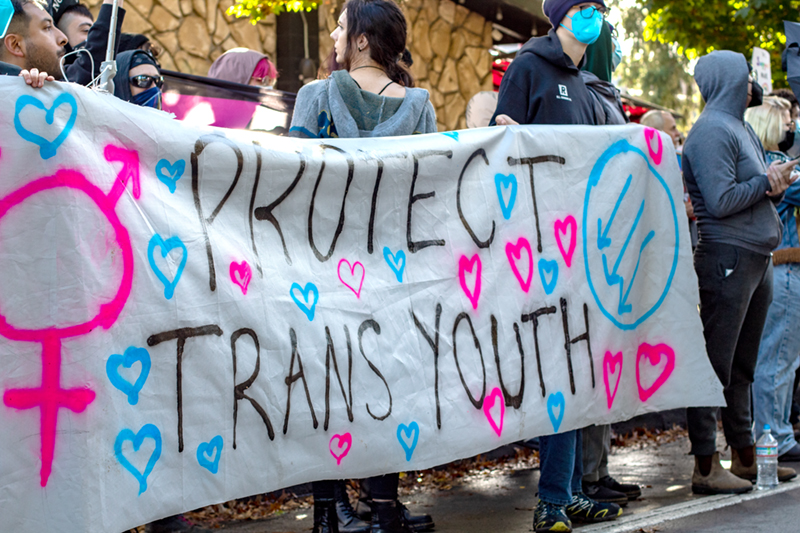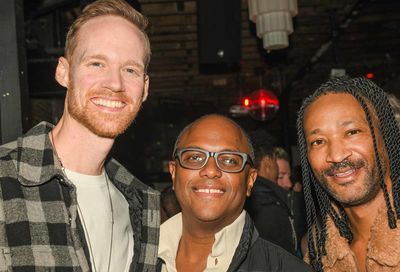Supreme Court refuses to hear Gavin Grimm case, will let pro-trans restroom ruling stand
By refusing to hear appeal, high court allows decision finding Gloucester County's restroom policy unconstitutional to stand.

On Monday, the U.S. Supreme Court refused to hear an appeal from a Virginia school board that was found to have discriminated against transgender student Gavin Grimm when it barred him from the boys’ restroom back in 2014.
In a brief statement, the Supreme Court denied a petition to hear the school board’s appeal of a lower court ruling finding their restroom policy discriminatory and unconstitutional.
Grimm, now a college student living in California, has become a notable figure in the LGBTQ rights movement after suing the Gloucester County School Board in 2015.
After he initially announced his transition, Grimm was permitted by school officials to use the boys’ restroom, but the school board later overruled that decision due to public pressure from angry parents and community members, as well as conservative activist groups.
As a result of the board’s decision, Grimm — and potentially any other transgender students — would be forced to use the restroom aligning with his assigned sex at birth, or, if he objected, would be offered the decision to use a single-stall restroom in the nurse’s office or a series of makeshift single-stall restrooms created from utility closets.
While other students would be allowed those single-stall restrooms if they chose — with most refusing and instead using traditional boys’ or girls’ restrooms — Grimm was the only student required to use them.
After Grimm sued the school board, the case eventually worked its way up to the U.S. Supreme Court and was scheduled to be heard in 2017, but that hearing was canceled after the Trump administration reversed guidance from the Obama Department of Education recommending that schools allow transgender children to access facilities matching their gender identity, in keeping with the spirit of Title IX.
Because the 4th Circuit had previously ruled in favor of Grimm on very narrow grounds — taking its cue from the Obama-era federal guidance — the Trump administration’s actions forced the high court to send the case back to the lower courts for further discussion.
The case stalled for a few years, but in 2019, a federal judge ruled in favor of Grimm, finding that Gloucester County’s restroom policy violated Title IX’s prohibitions on sex discrimination, as well as the U.S. Constitution’s guarantee of equal protection under the law.
The 4th U.S. Circuit Court of Appeals later upheld that decision, prompting the school board to request a rehearing of the case by the full 4th Circuit. When the 4th Circuit rejected that request, the board appealed to the Supreme Court, arguing that allowing transgender students to use facilities matching their gender identity infringes on cisgender students’ right to “bodily privacy.”
By refusing to hear the case, the high court allows the lower courts’ decision to stand, meaning students, not only in Gloucester County, but in any of the states covered by the 4th Circuit — Virginia, West Virginia, Maryland, North Carolina, and South Carolina — must allow transgender students to use the restroom matching their gender identity.
Barring future litigation from another circuit that brings the issue back before the Supreme Court, any judge in the states covered by the circuit dealing with transgender access to restrooms either must abide by the 4th Circuit’s decision in the Grimm case, or, if they rule against it, is likely to see their decision overturned by the appeals court.
“I am glad that my years-long fight to have my school see me for who I am is over,” Grimm said in a statement. “Being forced to use the nurse’s room, a private bathroom, and the girls’ room was humiliating for me, and having to go to out-of-the-way bathrooms severely interfered with my education. Trans youth deserve to use the bathroom in peace without being humiliated and stigmatized by their own school boards and elected officials.”
The Supreme Court’s decision not to hear the case comes at a time when the Biden administration has taken concrete actions to expand legal protections for LGBTQ students, with President Biden issuing an executive order aimed at prohibiting anti-LGBTQ discrimination by federal agencies.
As a result of that order, the Department of Education has issued guidance stating that anti-transgender discrimination is a form of illegal sex discrimination prohibited by Title IX. Both those actions also align with a previous Supreme Court decision from last year, in which the high court found the Civil Rights Act’s prohibitions on sex-based discrimination apply to instances where employers discriminate against current or prospective employees based on their sexual orientation or gender identity.
LGBTQ advocates praised the court’s decision not to hear the school board’s appeal.
“This is the third time in recent years that the Supreme Court has allowed appeals court decisions in support of transgender students to stand,” Josh Block, a senior staff attorney with the American Civil Liberties Union’s LGBTQ & HIV Project, said in a statement. “This is an incredible victory for Gavin and for transgender students around the country. Our work is not yet done, and the ACLU is continuing to fight against anti-trans laws targeting trans youth in states around the country.”
See also:
Uber Eats apologizes after being accused of outing trans drivers to customers
Turkey tear gassed an LGBTQ Pride march in Istanbul
Georgia boy who had “gay” shaved into head by family placed in protective custody
Support Metro Weekly’s Journalism
These are challenging times for news organizations. And yet it’s crucial we stay active and provide vital resources and information to both our local readers and the world. So won’t you please take a moment and consider supporting Metro Weekly with a membership? For as little as $5 a month, you can help ensure Metro Weekly magazine and MetroWeekly.com remain free, viable resources as we provide the best, most diverse, culturally-resonant LGBTQ coverage in both the D.C. region and around the world. Memberships come with exclusive perks and discounts, your own personal digital delivery of each week’s magazine (and an archive), access to our Member's Lounge when it launches this fall, and exclusive members-only items like Metro Weekly Membership Mugs and Tote Bags! Check out all our membership levels here and please join us today!



























You must be logged in to post a comment.